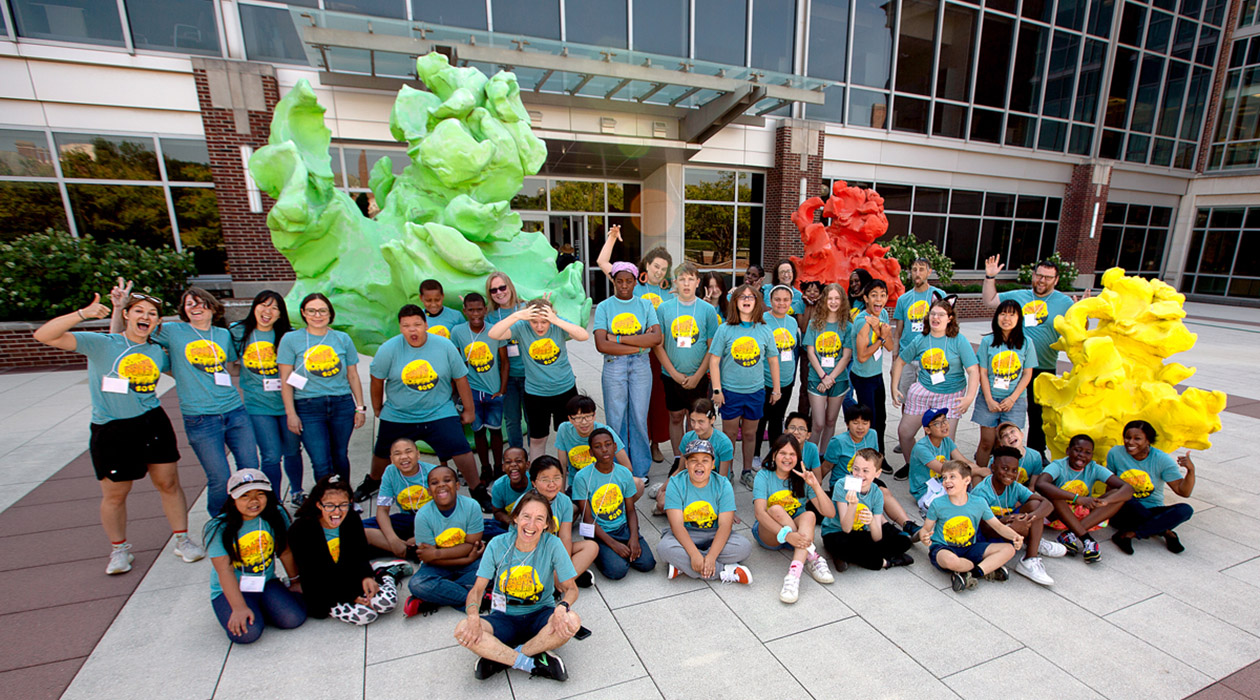Pollen Power camp inspires new generation of budding young scientists

Campers and staff from this year's Pollen Power pose in front of the IGB / Nicholas Vasi
Everyone knows about space camp, but have you heard of plant camp? Pollen Power summer camp, hosted by the Carl R. Woese Institute for Genomic Biology, offers local middle schoolers a unique experience filled with plant science-based summer fun.
Pollen Power has taken place every summer since 2013, with the goal of exposing middle schoolers to topics in plant biology while providing strong female mentorship, especially to underrepresented groups in STEM. Throughout the week, campers participate in a variety of activities aimed at teaching them not only about plants and pollinators, but also about working in a team, communication, and how to look at the world through the eyes of a scientist.
“At Pollen Power, students take something they consider an “ordinary everyday thing” in nature and learn to see it in a new light,” said Sarah Choi, the IGB’s Outreach and Education Coordinator and lead organizer of Pollen Power camp. “They start to appreciate the plants and pollinators around them. And through our activities and experiments they leave feeling like scientists, with more curiosity about the world around them.”
The camp is funded by the Center for Advanced Bioenergy and Bioproducts Innovation theme within the IGB, and the Champaign Unit 4 School District. Incoming 5th-8th grade students were invited to join the camp that ran this year from June 5th-9th. This is the first Pollen Power held in-person at the IGB since the COVID-19 pandemic.
Campers were placed into small groups that then were each assigned a staff member from Franklin STEAM Academy to closely mentor them. Together, they designed week-long experiments to test the growth rate of cress seeds under various conditions. Some plants were given coffee or sports drinks instead of water, others were grown on paper towels or within plastic bags instead of in a dirt cup, and one team even tried placing their plant within a fridge to see what would happen. As one might guess, the plants given water and access to sunlight grew the best, though the campers discovered that the seeds placed in a plastic bag also grew well, likely due to the enclosure creating a greenhouse-like effect.
“I loved that the students got to understand how an experiment runs from the original hypothesis to the final observations and conclusions,” said Zanne Newman, Magnet Site Coordinator at Franklin STEAM Academy and one of the mentors. “The students took the experiments very seriously and monitored the plants closely every day. I only wish we had an additional week so that the plants could have grown more!”
Campers participated in many different experiments and activities throughout the week led by members of the IGB and CABBI. They foraged for leaves, flowers, and insects in and around the campus, and practiced identifying different plants in the ACES plant biology and Conservatory greenhouses. Campers then viewed what they had foraged under microscopes, as well as learned how to extract chlorophyll from leaves. The campers also occasionally gathered at the ACES Funk library for book discussions and a scavenger hunt.
“We all enjoyed being together from the morning games to all the day’s learning activities,” Newman said. “The kids really connected with each other and the material and had such a rich learning experience.”
Throughout the week, the campers were given tours of state-of-the-art campus labs and facilities in the IGB Core, where scientists assisted the campers in using confocal microscopes and 3D imaging to visualize different types of pollen particles and reconstruct images of plants. The campers also created art using the plants they had gathered, such as watercolor painting with the chlorophyll dye they extracted, and stamping imprints of leaves.
By the end of the week, it was clear to all of the Franklin and IGB staff that the campers had learned so much, and gained a deeper appreciation for the plants and pollinators around them.
“A lot of the science activities and themes were so rich and engaging,” explained Newman. “These kids missed a lot of science in school due to the pandemic, and learning through these hands-on science lessons was amazingly INVALUABLE! I loved the IGB staff and their enthusiasm for the kids and the material, and the camp was so well scheduled; I can’t believe we packed so much learning into a short 5 days! This was the most fun summer camp I have ever been a part of!”
